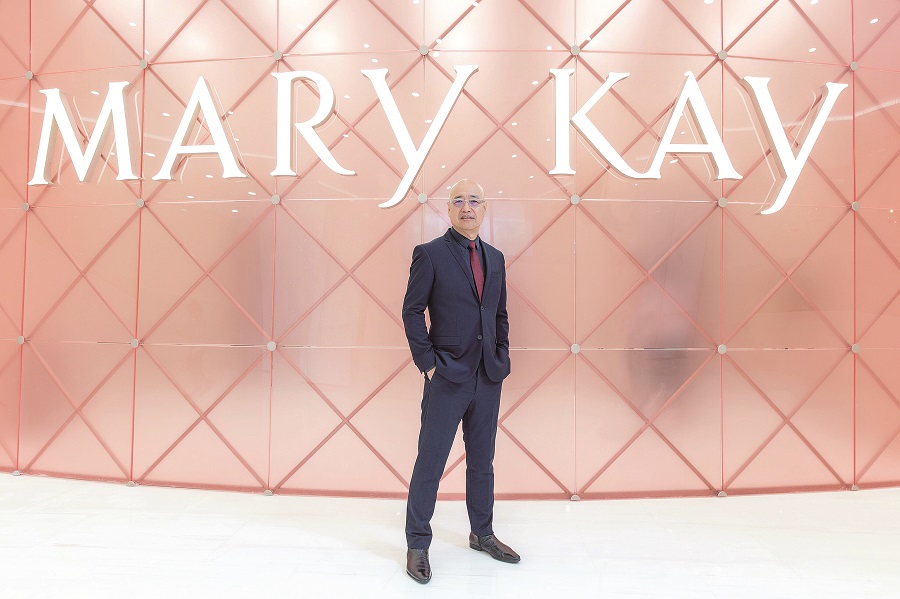Coming full circle back to where he was born
By ALYWIN CHEW in Shanghai | China Daily | Updated: 2018-10-13 00:46

He might have left China at a young age, but Paul Mak appears to have come full circle in life, having put down roots in Shanghai where he has worked for the past 28 years.
Born in Guangzhou, Guangdong province, Mak, who is currently the president at Mary Kay Greater China, relocated to Hong Kong when he just four years old before moving to the United States during his teenage years to further his studies.
Born with a talent for mathematics and science, Mak graduated with honors from the Illinois Institute of Technology in Chicago with a Bachelor’s degree in chemical engineering.
But he was not interested in becoming a scientist focused on research matters. Instead, he aspired to do work “that would be connected to the commercial world” and as such ended up at SC Johnson, one of the world’s leading manufacturers of household cleaning supplies and consumer chemicals.
His first encounter with China after leaving his hometown came in 1983 when he had to help SC Johnson set up a factory in Beijing. Seven years after that fateful visit, Mak was assigned to helm the manufacturing and engineering divisions of Shanghai Johnson Co Ltd, the first China joint venture of SC Johnson.
Looking back, Mak still marvels at the stark contrast between present day Shanghai and the one from the past.
“When I was here in the 1980s, people were saying that China needed 50 years to catch up with Hong Kong,” he said. “At that time, no one would have imagined that Shanghai could change so much, so quickly. Today, the landscape in Shanghai seems to change every few months with new buildings popping up all the time.
“But it’s not just the architecture — people’s mindsets have changed just as quickly. Back then, most people had a very simple view of the world and life. Most of our workers didn’t plan for the long term. They just wanted to go to work, do their job and get their income. It was all about survival. Nowadays, people here have more dreams and goals. The outlook of life is just so different now.
“And I feel special to be able to witness all the changes that have taken place. I think it’s a once-in-a-lifetime experience to be here to witness such a stunning development.”
In 1997, Mak joined the cosmetic giant Mary Kay as the head of their manufacturing operations in China. Just one year later, he was promoted to the role of president.
Since taking charge of the company’s operations in China, Mak has emphatically demonstrated that his business acumen is as strong as his forte in math and science, helping boost Mary Kay’s sales in the country by 100 times over the past 17 years.
Dollars and cents aside, Mak has also helped elevate the company’s reputation as an organization that empowers women.
In 2002, he spearheaded a microcredit program called the Mary Kay Women’s Small Business Fund which has since helped more than 10,000 women in Yunnan province become entrepreneurs. According to the United Nations Development Programme, which has been a supporter of this initiative since 2012, the company has contributed nearly $20 million to the cause.
“I believe in helping others not by giving them a fish, but by teaching them how to fish,” explained Mak of the decision to introduce such a program. “Also, this project is perfectly aligned with Mary Kay’s goal of helping women.”
The 60-year-old today also wears numerous hats that illustrate how active he is within the local business ecosystem. Besides being the vice chairman of the Shanghai Association of Enterprises with Foreign Investment, Mak also helms the Jing’an District Association of Enterprises with Foreign Investment and is a board member of the China chapter of the world’s largest nonprofit educational organization Junior Achievement.
He is also a keen supporter of exchange between China and the rest of the world. One of his most recent endeavors was at the 2017 Global Sustainable Development Innovation Conference in Germany where he spoke about how his company is helping address issues on gender inequality and global sustainable development.
Mak points out that such exchanges are vital to deepening the understanding of cultures.
“The average American doesn’t understand China. They have to be here to see and listen to what’s going on in order to know what’s truly happening.
“Most of the time, the things they read on the news are filtered and they don’t get the full picture. Having exchange promotes better understanding between two countries,” he said, before referring to stereotypes on Chinese manufacturing.
“Back in the 1980s, we were concerned about the quality of manufacturing equipment that were made in China so we mostly imported from the US or Europe. Today, it no longer matters where something is made,” Mak continued. “Of course, some imported machines might be better, but cheaper local machines are certainly something to consider these days. The stigma that things made in China are of low quality has largely gone away in the industry.”
























